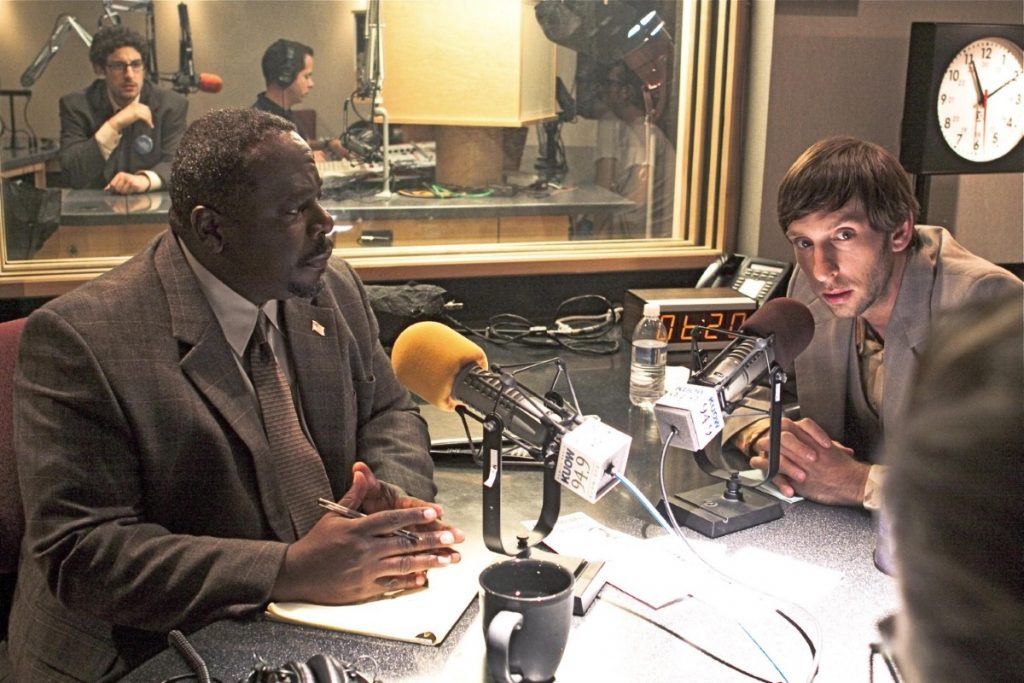Review: Grassroots
In the US, they released Grassroots to influence the presidential debate. In the UK, it's released to capitalise on it.
This charming, unpredictable indie comedy follows Grant Cogswell, a passionate, slightly deranged green campaigner, as he tries to unseat Richard Mciver, an incumbent Democrat on Seattle's city council. Told from the perspective of his flustered but talented campaign agent, Phil Campbell (played by American Pie's Jason Biggs) it manages to avoid the predictable structure of most political films and make some complicated, nuanced points about idealism and modern politics.
Campbell, whose memoir of the real life election, Zioncheck For President, forms the basis for the script, is joined by his girlfriend, Six Feet Under's Lauren Ambrose. She brings the same mix of sweetness, intelligence and emotional warmth to this film as she did to that series. Her worries about the campaign – and the unsettled question of whether its success is based on an undercurrent of racism – provide an complex and intelligent moral counterweight to the central plot.
Director Stephen Gyllenhaal has been doing some interesting things with the marketing of this film. In every American city the film opened in during the summer, he set up informal debates between a real local candidate and audience members. The film itself is an angry cry against a political system in which money talks – from super PACs to backroom deals. It also has an unmistakeably left-wing bent. I rather admired that the film chose to be honest rather than manipulative about its politics, which it wears proudly and unashamedly. More conservative viewers may find its assumptions irritating, but the film has a general goodwill to it which should keep them on board.


The political tint suggests a left-wing diatribe against corporate culture, cars, fossil fuels and the isolation of western capitalism. That's in there, but Grassroots ends up making some very mature comments about the nature of idealism, predominantly through the character of Cogswell, who starts the film banging his shoes on driver's windshields shouting "doesn't this suck?" and ends it competing at a city-wide political level. The director has an adult's eye for the downsides of idealism, which include harshness, simplification, puritanism and intolerance of alternate viewpoints. He also has a touching belief in the powers of compromise and personal decency which transcend the political limitations of the film.
Ultimately, Grassroots is extremely positive about politics; refusing to surrender to cynicism despite the money and hysteria fuelling in the American electoral system. In Gyllenhall's worldview, people enter politics because they care about their community. They want to do good, even if the status quo constantly tries to pull them down.
The complex political narrative is mirrored by an unpredictable plot, reflecting the story's real-life origin from the early 2000's. The film creeps up to the edge of predictability on several occasions before veering off in another direction altogether. The surprises last until the last reel.
Worthy as it may be, Grassroots remains pacey, funny and enjoyable throughout. "I'm a journalist," Cogswell insists at one point, only for Campbell to reply: "You're an unemployed music critic. People know the difference." Political geeks will enjoy the tactical details, including a running joke about George Bush's habit of asking interrogators to repeat the question so he had time to think of an answer.
Probably the most shocking aspect came in the realisation that a film set in 2001 was being treated as a period piece. Characters smoke in cafes, the TVs look enormous, and a scene in which someone tries to get on the internet – complete with the strange beeps and noises that used to accompany the technology – is played for laughs.
Gyllenhall's effort to affect the US presidential race through this sweet-natured indie comedy is perhaps a little optimistic. Its release date in the UK – just three days after the polls close across the Atlantic – suggest the distributers are being somewhat more cynical in their approach over here. Either way, it’s a smart, funny, kind-hearted film, which deserves as large an audience as possible.

